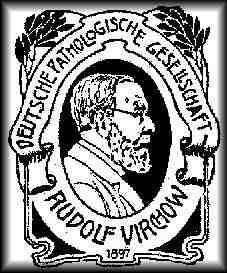

Virchow was the first to demonstrate that the cell theory applies to diseased tissue as well as to healthy tissue-that is, that diseased cells derive from the healthy cells of normal tissue. He did not, however, accept Louis Pasteur's germ theory of disease. He is best known for his text Cellular Pathology as Based on Histology (1850-1860). He engaged also in extensive research in the fields of archaeology and anthropology, producing numerous writings, among them Crania Ethnica Americana (1892). Other publications include discussions of topical political and social questions. Virchow was influential in German politics and from 1880 to 1893 served as a Liberal in the German Reichstag, where he opposed the policies of the German chancellor Prince Otto von Bismarck. He was instrumental in the establishment of the Pathological Institute and Museum in Berlin.